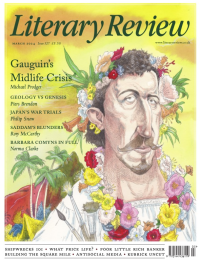Allan Massie
Becoming George Orwell
Burma Sahib
By Paul Theroux
Hamish Hamilton 390pp £20
Paul Theroux is the author of more than fifty books. Thirty-three of them have been novels – and this is the thirty-fourth. While assiduous and always interesting as a novelist, he is probably better known for his travel books, some of which have been bestsellers. Yet I would guess he thinks of himself primarily as a novelist.
Ambitious and readable, Burma Sahib is a novel about George Orwell’s five years in Burma, to which he went as a very young man, more or less straight from Eton. He was Eric Blair then; the writer we know as Orwell hadn’t yet been born. Theroux’s novel presents Blair’s first steps towards becoming Orwell. (He never changed his name by deed poll and old friends always called him Eric, a name he disliked. Theroux calls him ‘Blair’ throughout the novel.)
Blair’s father had been an Indian civil servant in the department concerned with the administration of the opium trade, but I have never been quite sure why Eric chose to serve in the Burma police. (There is no sign, certainly, that he did so in the Kipling spirit as an enthusiast for the empire.) Blair’s time in Burma would provide the material for his first, not very good, novel, Burmese Days. Burma Sahib is, perhaps not surprisingly, a better novel, and the picture of Burma Theroux offers is livelier than Blair’s: ‘past the marshes where the air was heavy with the sharp smell of the muddy riverbank, and the night-dampened leaves of the overhanging trees, the croaking of frogs that sounded like mockery’.
Blair seems to have spent his five years in Burma in a spirit that was both dutiful and resentful. He disliked the natives while feeling sorry for them and he disliked the British there too, not only those he worked with but also the civil servants and planters. They were

Sign Up to our newsletter
Receive free articles, highlights from the archive, news, details of prizes, and much more.@Lit_Review
Follow Literary Review on Twitter
Twitter Feed
Under its longest-serving editor, Graydon Carter, Vanity Fair was that rare thing – a New York society magazine that published serious journalism.
@PeterPeteryork looks at what Carter got right.
Peter York - Deluxe Editions
Peter York: Deluxe Editions - When the Going Was Good: An Editor’s Adventures During the Last Golden Age of Magazines by Graydon Carter
literaryreview.co.uk
Henry James returned to America in 1904 with three objectives: to see his brother William, to deliver a series of lectures on Balzac, and to gather material for a pair of books about modern America.
Peter Rose follows James out west.
Peter Rose - The Restless Analyst
Peter Rose: The Restless Analyst - Henry James Comes Home: Rediscovering America in the Gilded Age by Peter Brooks...
literaryreview.co.uk
Vladimir Putin served his apprenticeship in the KGB toward the end of the Cold War, a period during which Western societies were infiltrated by so-called 'illegals'.
Piers Brendon examines how the culture of Soviet spycraft shaped his thinking.
Piers Brendon - Tinker, Tailor, Sleeper, Troll
Piers Brendon: Tinker, Tailor, Sleeper, Troll - The Illegals: Russia’s Most Audacious Spies and the Plot to Infiltrate the West by Shaun Walker
literaryreview.co.uk